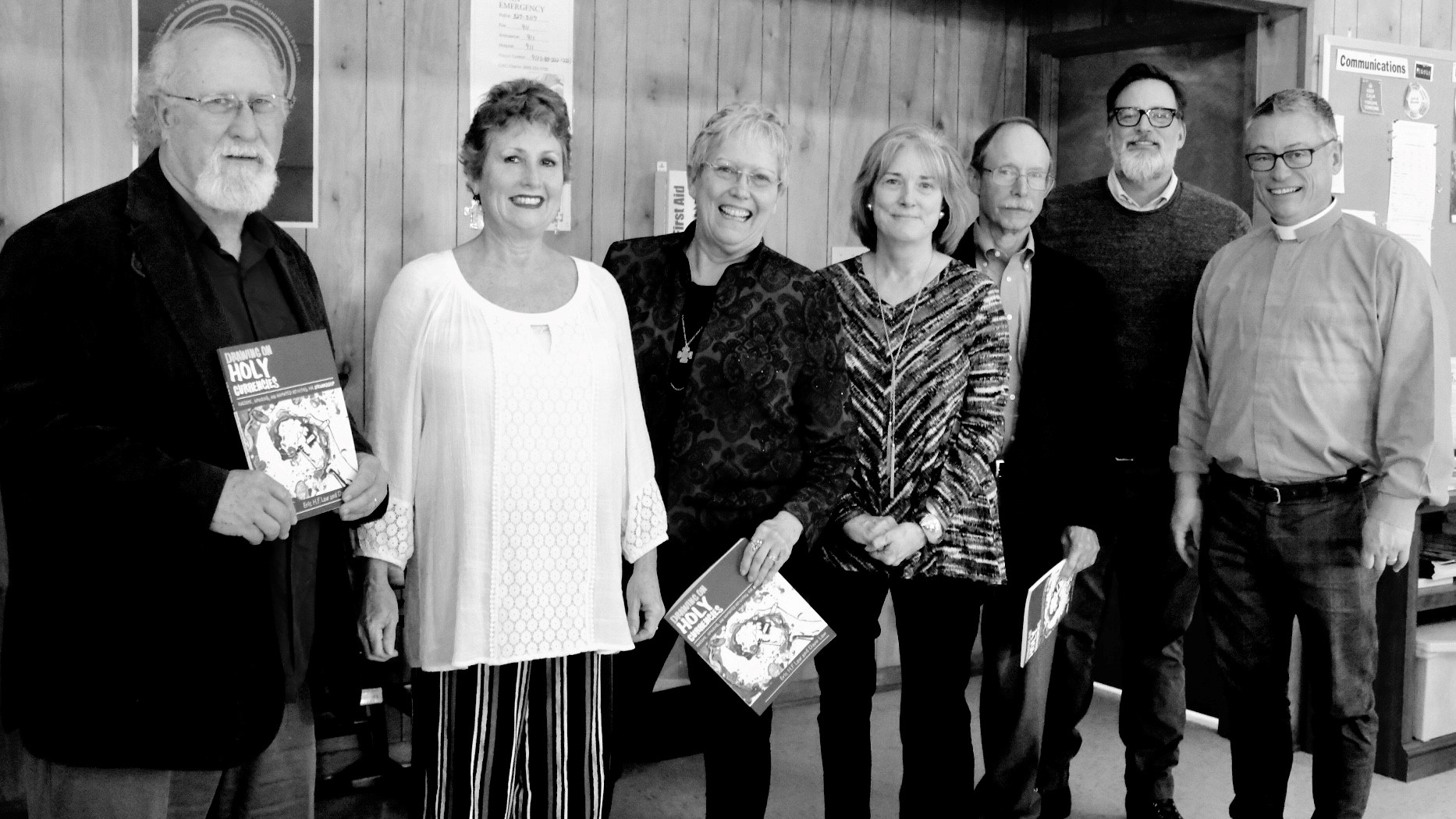 The St. Luke’s, Livingston Mental Health team from left to right is Nolan Gouthier, Florence Cruz, Susan Tullos, Carla Gore, George Wood, Eric Moen (EHF), the Rev. Bill Cruse (Kaleidoscope Institute)
The St. Luke’s, Livingston Mental Health team from left to right is Nolan Gouthier, Florence Cruz, Susan Tullos, Carla Gore, George Wood, Eric Moen (EHF), the Rev. Bill Cruse (Kaleidoscope Institute)
In December 2017, the Episcopal Diocese of Texas devoted an entire issue of the Diolog magazine to mental health. The magazine articles not only created awareness of mental health issues across the diocese, it was the spark that led to an open and frank conversation with a group of parishioners at St. Luke’s Episcopal Church in Livingston.
“We came into this mental health ministry in hopes it would fill a personal need of knowledge and information on ‘how can I help or how can I get help for a loved one?’” said Carla Gore, a member at St. Luke’s. “So, we started meeting to try to figure out where to begin.”
Susan Tullos was also part of that original conversation and became a part of the St. Luke’s congregation team focused on mental health. She said the challenge to understand more about mental health issues became very large, very quickly.
“In the beginning, the St. Luke’s Mental Health Team of five members attempted to investigate the community-wide mental health offerings and needs,” Tullos said. “We thought we would be able to compile a plan of action based on our findings, but we soon determined that there were so many areas of need and ‘wish lists’ of the various agencies, that we became overwhelmed with the scale of it all. And then we heard about EHF and Holy Currencies.”
EHF’s Holy Currencies Ministry Incubator is a partnership between EHF, Kaleidoscope Institute and the Rev. Eric Law. The program provides a framework and tailored support to congregations to help build out their community-focused ministry idea.
St. Luke’s team spent eight months of focused work that included listening sessions with law enforcement, the local housing authority, and nonprofits. The team’s mental health ministry plan impacts Polk, San Jacinto, and Trinity Counties.
“Holy Currencies has been instrumental as a guideline into our search on our Mission for Lake Livingston Mental Health Initiative,” said Gore. “I do believe that despite how vast and mind boggling this endeavor is, we are forging a road in getting information to our community. Small steps will lead to leaps, then to paths and to roads of recovery, compassion and knowledge – all through the grace of God.”
The Lake Livingston Area Mental Health Initiative now participates in the Polk County Community Resource Coordination Group (CRCG) and hosts the active monthly group at St. Luke’s Episcopal Church.
“I will never forget attending the first Polk County CRCG meeting and hearing the extent of the various discussions regarding the scope and scale of mental health needs, the lack of professionals, the shortage of transportation; so many simple to very complex needs,” Tullos said. “Thanks to our EHF and Kaleidoscope training, we offered our Parish Hall for their monthly meetings. This has allowed us to get to better know the agency reps. and provide these hard-working people a light breakfast to start their day.”
“I believe everyone who attends the meetings are hoping for a united community relationship, not the agenda of their agency or company,” Gore added. “We are very excited about this new endeavor.”
Throughout the effort, the mental health ministry team developed relationships with local law enforcement and probation officers. In June, St. Luke’s hosted a Mental Health First Aid training for adult probationers. Team member George Wood coordinated the EHF-sponsored training and said that 23 adults on probation attended the event. Woods said many of the probationers shared experiences about their personal struggles and how those struggles often resulted in arrests and the criminal justice system.
“People really opened up and were active in conversations all day,” Wood said.
Continuing to build on their active and growing partnerships, St. Luke’s has developed actionable short-term goals and long-term goals for the mental health ministry.
Short-term goals:
- Mental and Behavioral Health training for the public to include:
- offering Mental Health First Aid training for both adults and youth
- developing a short overview of mental and behavioral health to local organizations
- hosting dinners at St. Luke’s with local speakers (began Lent 2019)
- working with local school boards to increase training
- educating adult probationers
- Work with Law Enforcement and advocate for their proposed Mental and Behavioral Health Unit
- Provide a central information system for Mental and Behavioral Health Services
Long-term goals:
- Respite care for caregivers
- Provide/coordinate transportation for individuals for mental health services
- Work with Stephen F. Austin University to support two social work interns
Tullos says these efforts are focused on addressing serious gaps in services.
“My hope is to see our team’s efforts be incorporated into a united community effort that is non-denominational and truly non-partisan; of persons from all walks of life working in-sync for improved mental health attitudes and offerings in our Lake Livingston area,” said Tullos.
If you would like to know more about the work happening at St. Luke’s Episcopal Church or how your congregation can explore Mental Health in your community, contact EHF’s Congregational Engagement Team.